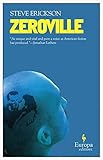 Steve Erickson’s Zeroville is a work of surpassing strangeness and beauty. In 1969, a little less than a week before the Manson Family massacre, an excommunicated ex-theology student arrives in Los Angeles after a six-day journey by bus from Pennsylvania. Vikar is possesed by movies, and he’s come to the promised land. He has a tattoo of Elizabeth Taylor and Montgomery Clift on his shaved head, a red tear drop inked below an eye.
Steve Erickson’s Zeroville is a work of surpassing strangeness and beauty. In 1969, a little less than a week before the Manson Family massacre, an excommunicated ex-theology student arrives in Los Angeles after a six-day journey by bus from Pennsylvania. Vikar is possesed by movies, and he’s come to the promised land. He has a tattoo of Elizabeth Taylor and Montgomery Clift on his shaved head, a red tear drop inked below an eye.
Books, movies, television, newspapers, and radio were forbidden by his unhinged Calvinist father. At 20, Vikar summons the courage to defy his father and see his first movie, and with this he finds a new religion. Movies make sense to him in a way that nothing else ever has. On the day he’s kicked out of divinity school, he shaves his head. The tattoos come later, en route to Hollywood.
Something is off about him, but it’s hard to say what. He’s on the autistic spectrum, or profoundly damaged by his upbringing, or both. He doesn’t understand comedies, and gets kicked out of horror movies for laughing. He is somewhat affectless, except when he’s violent. On his first day in Los Angeles, a hippie compliments his tattoo:
…[A] hippie nods at Vikar’s head and says, “Dig it, man. My favorite movie.”
Vikar nods. “I believe it’s a very good movie.”
“Love that scene at the end, man. There at the Planetarium.”
Vikar stands and in one motion brings the food tray flying up, roast beef and au jus spraying the restaurant–
–and brings the tray crashing down on the blasphemer across the table from him. He manages to catch the napkin floating down like a parachute, in time to wipe his mouth.
Oh, mother, he thinks. “A Place in the Sun, George Stevens,” he says to the fallen man, pointing at his own head. “NOT Rebel Without a Cause,” and strides out.
He lives for movies. He cares for little else, until he finds punk music and later books, and then he cares about those things too.
Zeroville chronicles Vikar’s rise from handyman in the Roosevelt Hotel to set builder on the Paramount lot to visionary film editor. The story has a David Lynchian quality about it, a slow unraveling, a gradual shift from something close to realism, to improbable meetings and coincidences and patterns and signs, to a kind of dream-logic flickering surrealism. The book’s very structure — 300 chapters ranging in length from one word to several pages — lends the book the stutter-stop fragmentation of a film reel or a dream.









